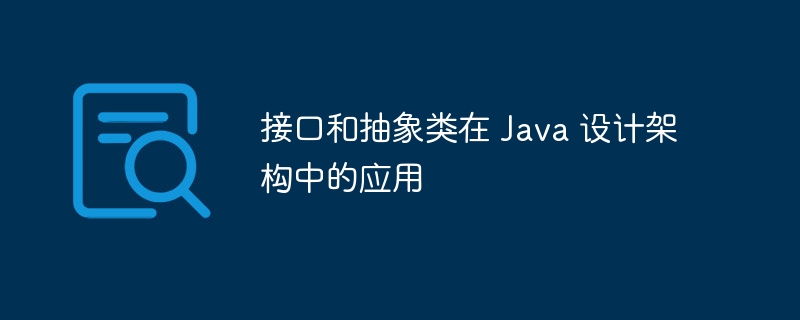
Interfaces and abstract classes are used in Java to design architecture and provide contracts and behavioral specifications. Interfaces define unimplemented method signatures, and classes that implement the interface must provide implementations. The advantages include decoupling, reuse, and enforcing consistent behavior. Abstract classes contain abstract methods (not implemented) and concrete methods (implemented), with advantages including partial implementation and preventing the creation of unnecessary objects. The main difference is that the interface must be fully implemented, while the abstract class can be partially implemented; and the interface can be implemented by multiple classes, while the abstract class can only have one parent class. Interfaces are often used for pluggable service implementations, while abstract classes are used for shared default behavior.

In Java, interfaces and abstract classes are the key to building maintainable and extensible code means. They allow developers to define contracts or specify behaviors without having to implement the details.
Advantages:
Advantages:
| Features | Interface | Abstract class |
|---|---|---|
| Implementation | Must implement all methods | Partial implementation of methods |
| Instantiation | Cannot be instantiated | Cannot be instantiated directly |
| Access permissions | can be public and default | Can only be public, protected and default |
| Extensibility | Can use multiple implementations | Can only have one parent Class |
Interface is used to implement pluggable services:
interface DataProvider {
List<Object> getData();
}
class FileDataProvider implements DataProvider {
@Override
public List<Object> getData() {
// 从文件读数据
}
}
class DatabaseDataProvider implements DataProvider {
@Override
public List<Object> getData() {
// 从数据库读数据
}
}
// 使用不同的数据提供器读取数据
DataProvider dataProvider = new FileDataProvider();
List<Object> data = dataProvider.getData();Abstract Classes are used to share default behavior:
abstract class Animal {
protected String name;
public Animal(String name) {
this.name = name;
}
public abstract void speak();
public void eat() {
// 默认吃饭行为
}
}
class Dog extends Animal {
public Dog(String name) {
super(name);
}
@Override
public void speak() {
System.out.println("汪汪");
}
}
// 创建并使用 Dog 对象
Dog dog = new Dog("Spot");
dog.speak(); // 输出 "汪汪"
dog.eat(); // 使用 Animal 的默认吃饭行为The above is the detailed content of Application of interfaces and abstract classes in Java design architecture. For more information, please follow other related articles on the PHP Chinese website!
 Introduction to hard disk interface types
Introduction to hard disk interface types
 Garbled characters starting with ^quxjg$c
Garbled characters starting with ^quxjg$c
 Why the computer keeps restarting automatically
Why the computer keeps restarting automatically
 Usage of SetTimer function
Usage of SetTimer function
 head command usage
head command usage
 How much is Dimensity 6020 equivalent to Snapdragon?
How much is Dimensity 6020 equivalent to Snapdragon?
 How to solve the problem of garbled characters when opening a web page
How to solve the problem of garbled characters when opening a web page
 Cryptocurrency trading platform rankings
Cryptocurrency trading platform rankings




